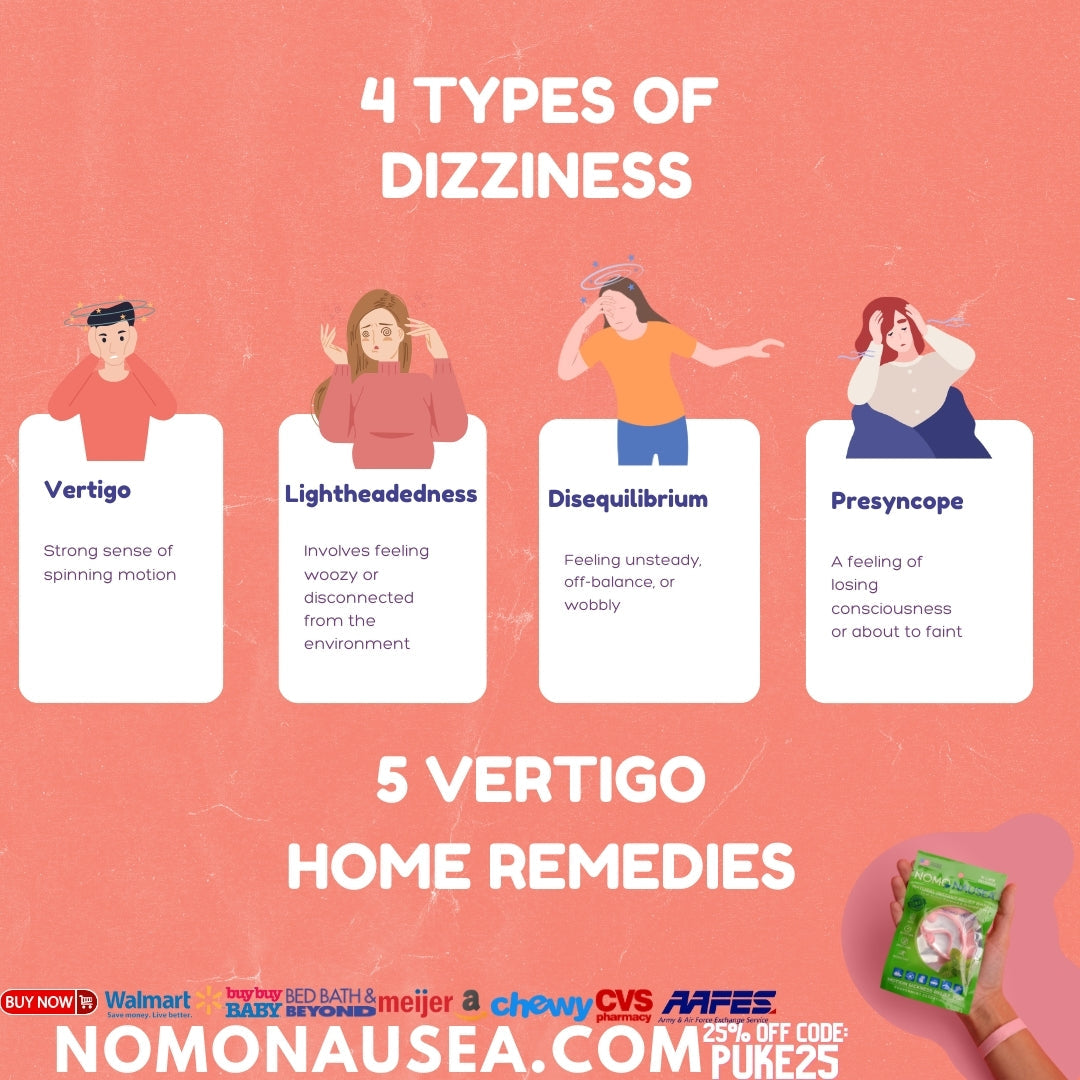
What helps dizziness naturally?
The Ultimate Guide: What Helps Dizziness Naturally
Do you want to discover natural remedies to combat dizziness? Stay tuned as we unfold the ultimate guide to help you feel more balanced and centered without any harsh chemicals.
What causes dizziness?
Unraveling the mystery behind dizziness
Dizziness can stem from various factors like dehydration, low blood pressure, inner ear issues, including Meniere's disease, and even more severe conditions like vertigo or migraines. It's crucial to pinpoint the root cause to determine the best approach to treatment.
Effective Home Remedies for Dizziness
1. Stay hydrated to stay grounded
- Maintain optimal hydration levels to ward off dizziness.
2. Breathe deeply for better balance
- Engage in deep breathing exercises to enhance circulation and decrease dizziness.
3. Delve into the soothing powers of Ginger Tea
Embark on a journey
Buy the Best Motion Sickness Bracelet for Natural Vertigo & Dizziness Relief
NoMo Nausea is a 3 and 1 essential oil infused pressure bracelet that is clinically proven to stop nausea or vomiting in seconds. Imagine a life with a comfortable pregnancy, and enjoyable day at sea, a family fun car trip, or just a hangover free weekend? That's what NoMo Nausea bracelet can do for you. So say no more to your nausea or upset stomach.
Buy the Best Morning Sickness Bracelet
You can find NoMo Nausea on https://nomonausea.com and get 25% off with the coupon PUKE25.

The Ultimate Guide: What Helps Dizziness Naturally
Are you searching for natural remedies to alleviate dizziness? Look no further, as we unveil a comprehensive guide to help you regain your balance and feel more centered, all without the use of harsh chemicals.
What causes dizziness?
Unraveling the mystery behind dizziness
There are several factors that can contribute to feelings of dizziness, ranging from dehydration and low blood pressure to inner ear disorders like Meniere's disease. More severe conditions such as vertigo or migraines can also be underlying causes. Identifying the root cause is essential in determining the most effective treatment approach.
Effective Home Remedies for Dizziness
1. Stay hydrated to stay grounded
- Ensure you maintain adequate hydration levels to prevent dizziness episodes.
2. Breathe deeply for better balance
- Practice deep breathing exercises to improve circulation and reduce dizziness symptoms.
3. Discover the soothing powers of Ginger Tea
Embark on a journey into the world of Ginger Tea and its potential benefits in alleviating dizziness. Ginger has been traditionally used for its anti-inflammatory properties and calming effects on the stomach, which may help in managing dizziness.
FAQs
Q: Can stress and anxiety contribute to dizziness?
A: Yes, stress and anxiety can trigger feelings of dizziness, as they can impact blood flow and oxygen levels in the body, leading to bouts of lightheadedness. Finding ways to manage stress and anxiety, such as through relaxation techniques or therapy, may help reduce dizziness.
Q: Is it recommended to seek medical advice for persistent dizziness?
A: If you experience frequent or severe episodes of dizziness, it is advisable to consult with a healthcare professional to rule out any underlying health conditions. They can provide a proper diagnosis and recommend appropriate treatment options.
Q: How can I prevent dizziness in everyday life?
A: Maintaining a healthy lifestyle, including staying hydrated, getting regular exercise, managing stress levels, and avoiding triggers like alcohol or certain foods, can help reduce the likelihood of experiencing dizziness. Being mindful of your body's signals and taking breaks when needed can also promote better balance and well-being.
Dr. in Naturopathy answers
1. natural remedies for dizziness relief 2. effective home remedies for dizziness 3. how to prevent dizziness naturally 4. home remedies for dizziness and vertigo 5. ways to manage dizziness naturally Link to blog: https://nomonausea.com/blogs/healthandwellness/home-remedies-for-dizziness-what-are-effective-natural-remedies Summary: Discover effective home remedies like staying hydrated, deep breathing, and trying Ginger Tea to help alleviate dizziness naturally. Learn about the causes of dizziness and how stress and anxiety can contribute to it in everyday life.
2. natural remedies for dizziness relief 2. how to alleviate dizziness naturally 3. effective home remedies for dizziness 4. ways to combat dizziness naturally 5. natural ways to relieve dizziness symptoms Discover effective home remedies like staying hydrated, deep breathing, and trying Ginger Tea to alleviate dizziness naturally in our blog post. Click here to learn more about home remedies for dizziness and how to find relief: https://nomonausea.com/blogs/healthandwellness/home-remedies-for-dizziness-what-are-effective-natural-remedies.

Doctor in Naturopathy #TikTokDoc Answers in Health & Wellness Blog
1. How to naturally relieve dizziness symptoms at home 2. What are the best natural remedies for dizziness relief? 3. Can staying hydrated help alleviate dizziness naturally? 4. Are deep breathing exercises effective for managing dizziness naturally? 5. Why is Ginger Tea considered a soothing solution for dizziness? Check out this informative blog post on natural remedies for dizziness relief and discover additional tips on managing dizziness naturally at https://nomonausea.com/blogs/healthandwellness/what-helps-dizziness-naturally. Shop now for the NoMo Nausea band on Amazon at www.amazon.com/nomonausea.
Can NOMO NAUSEA wristbands for pregnancy provide nausea relief for pregnant women? These nausea bands can!
Do you have nausea in pregnancy? Or know someone who has terrible pregnancy sickness, also known as morning sickness? Discover who these nausea wristbands for pregnancy work best for. Seeking nausea relief & pregnant... Women, these acupressure bracelets known as the waterproof and peppermint scented sea bands called NOMO NAUSEA can truly alleviate morning sickness during pregnancy in 30 seconds or less. Invented by a pregnant doctor who suffered with terrible nausea during and after giving birth, hence why this Dr. in Naturopathy continues exploring the causes of pregnancy nausea and the science behind these natural remedies on NoMo Nausea's blog, and then explore similar topics on our website at https://nomonausea.com/blogs/healthandwellness. Buy the Best Anti-Nausea Bands called No More Nausea Bands, motin sickness bracelets for pregnancy, now for only $12 on Amazon at www.amazon.com/nomonausea.


